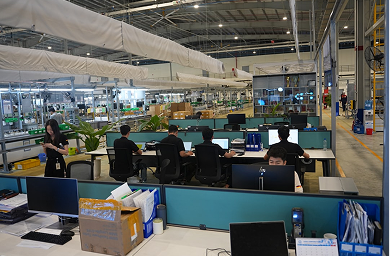In recent years, the trend of domestic labor export has become a "hot" topic, drawing considerable interest from businesses and workers in Vietnam. The concept of "domestic labor export" may sound unusual, but it actually reflects a new trend in today’s labor market. Instead of exporting labor abroad, many companies are now utilizing the local workforce to serve major industries, particularly electronics and semiconductor manufacturing. Let’s take a closer look at this trend and the opportunities and challenges it presents.
1. Domestic Labor Export: A New Concept with Great Potential
The term "domestic labor export" might initially seem like a synonym for domestic employment. However, it actually refers to supplying skilled labor for large projects and manufacturing facilities within Vietnam—areas that previously required foreign labor. This trend is particularly prominent in industries requiring high technical skills, such as electronics and semiconductors.
With the rapid growth of major corporations in Vietnam's technology and electronics manufacturing sectors, numerous job opportunities have opened up for local workers. Rather than exporting labor to developed countries like Japan or South Korea, many Vietnamese workers can now work domestically with benefits and working conditions that meet international standards.
2. Why is Domestic Labor Export Such a "Hot" Topic?
The growing demand for high-quality labor in industries like electronics and semiconductors has driven companies to seek skilled and experienced workers within Vietnam. These companies require not only a large workforce but also individuals trained in modern production technologies.

The development of industrial zones in Vietnam has also fueled this trend. As Vietnam becomes an attractive destination for global tech giants, the demand for domestic staffing grows. Many companies now prefer to focus on sourcing labor through reputable providers like GLA HR, a leading agency supplying high-quality personnel to key industries.
3. Opportunities and Challenges in Domestic Labor Export
Viewed broadly, domestic labor export trend offers significant opportunities for both businesses and workers. For companies, sourcing labor locally helps reduce costs associated with importing foreign labor and ensures stability and continuity in production. For workers, it means they no longer need to work abroad, as they can find well-paid, professional employment locally.
However, challenges accompany these opportunities. To meet the demands of high-tech industries, workers must undergo vocational training at reputable HR firms. GLA HR, one of Vietnam’s leading vocational training centers, not only provides basic skills but also ensures that workers are familiar with international standards and able to adapt quickly to new technologies.
Moreover, supplying labor for major projects requires close cooperation among regulatory bodies, training centers, and businesses. Policy, financial, and HR management support mechanisms must be considered to ensure a smooth and efficient labor supply process.
4. The Role of GLA HR in Staffing
GLA HR has established itself as a trusted partner for many large businesses in providing high-quality labor. Beyond recruitment, GLA HR focuses on vocational training, ensuring that workers are well-prepared with the necessary knowledge and skills before entering the workplace.
With experienced instructors, state-of-the-art facilities, and internationally standardized training programs, GLA HR has enabled numerous Vietnamese workers to work for major corporations without needing to go abroad. This is not only economically beneficial but also improves the quality of the domestic labor force, meeting the rigorous demands of modern industries.
The domestic labor export trend is not just a temporary solution but a long-term strategy to improve the quality of Vietnam’s workforce. With the growth of high-tech industries like electronics and semiconductors and support from HR providers like GLA HR and its vocational training programs, Vietnam is steadily positioning itself as a leading center for high-quality production and staffing in the region. This trend not only creates numerous opportunities for workers but also fosters sustainable development for businesses in the domestic market. In the coming years, domestic labor export is sure to remain a “hot” topic, garnering attention from various sectors.
Join our Zalo group for HOT JOB opportunities: https://zalo.me/g/osiedw964


